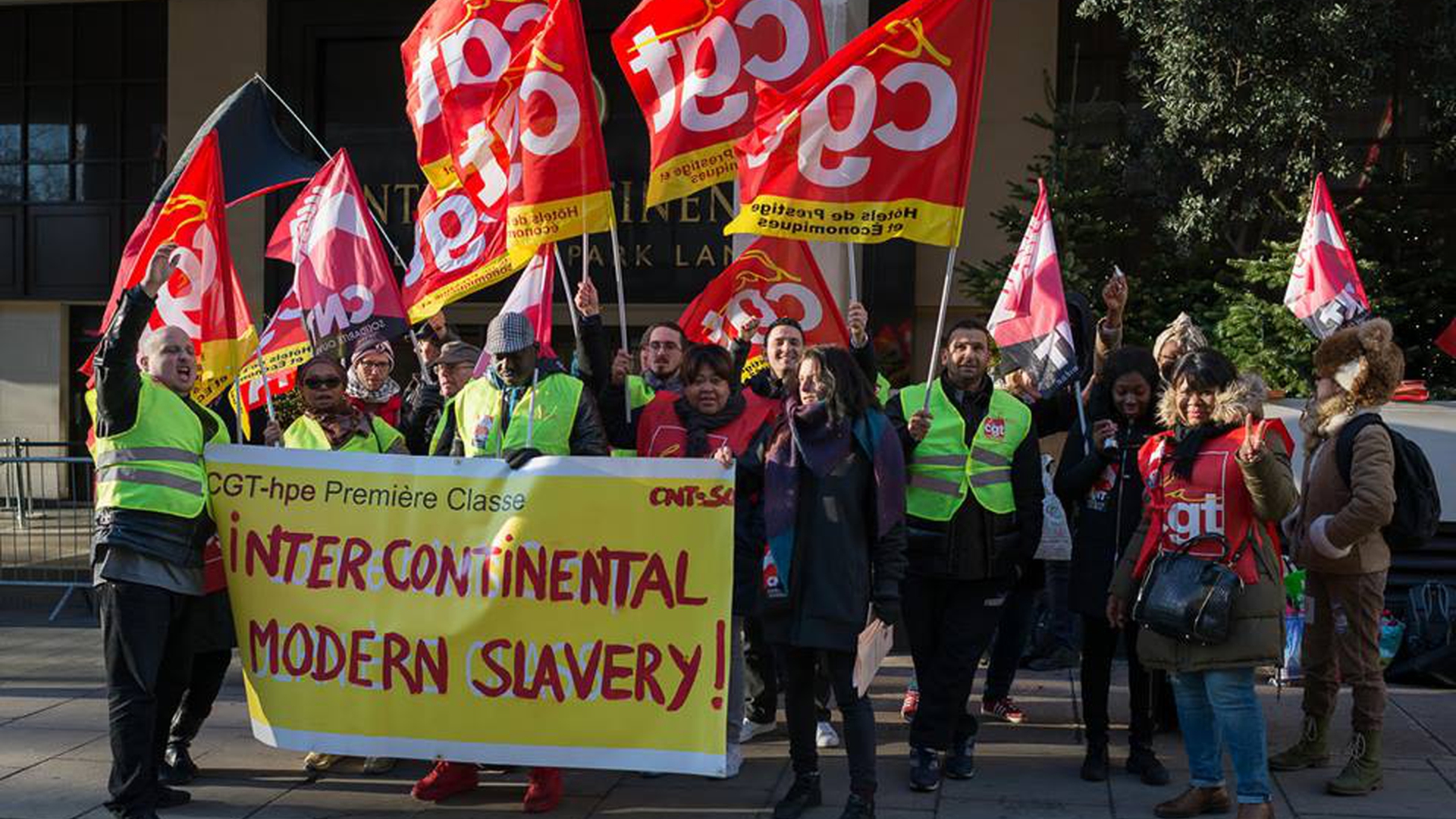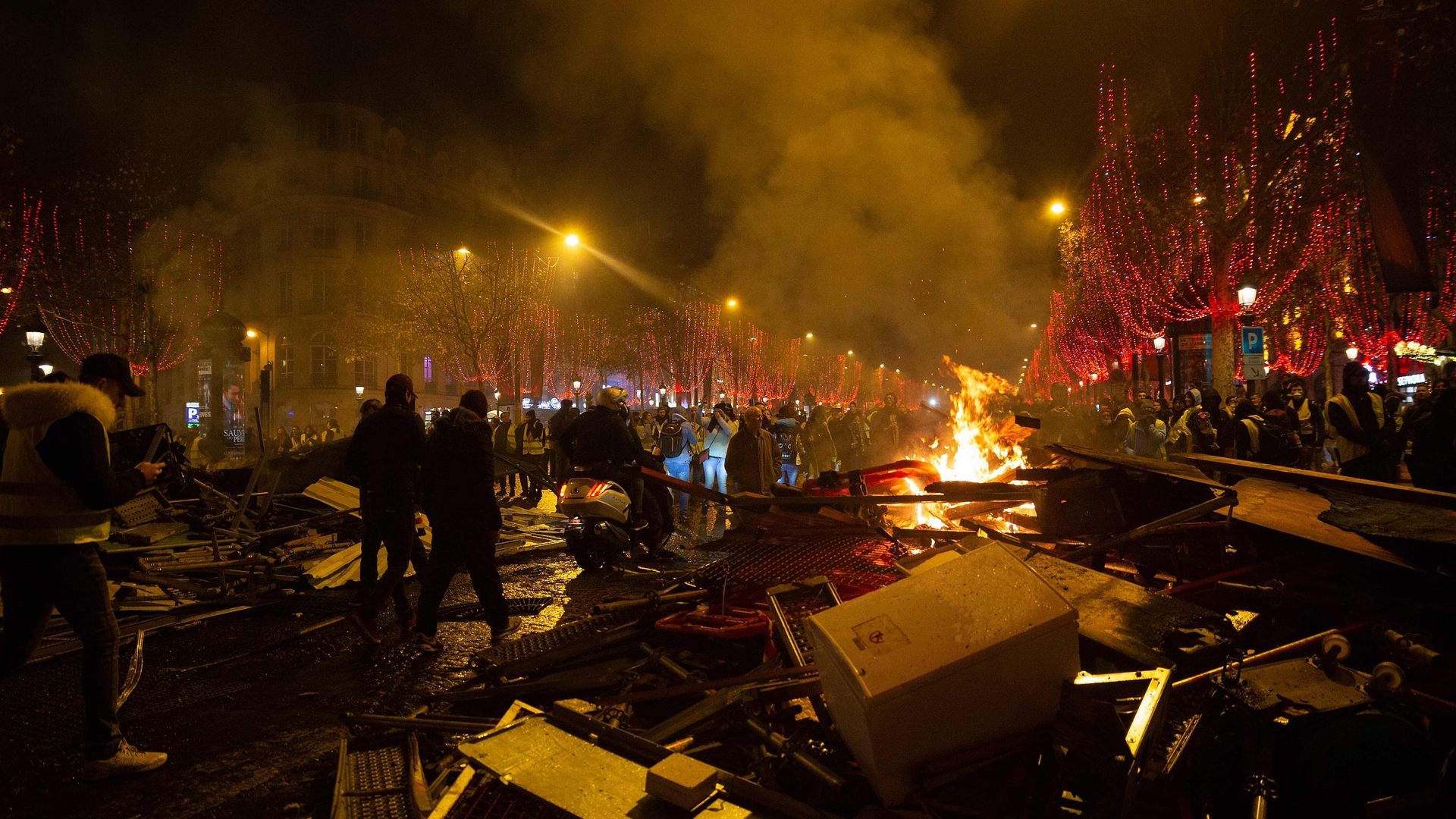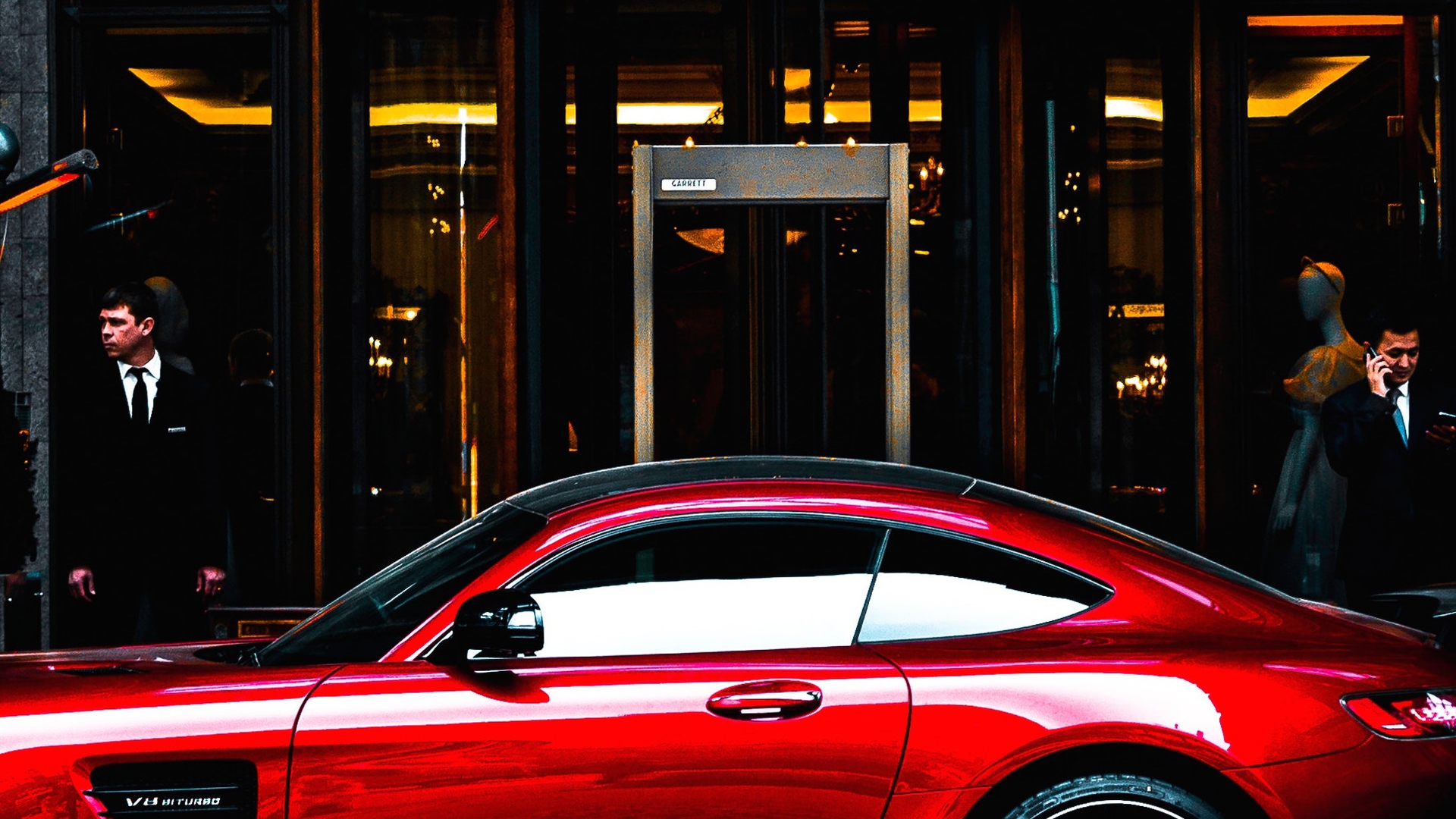The Gilets Jaunes and the Unions: A convergence over what?
inquiry
The Gilets Jaunes and the Unions: A convergence over what?
by
Rachel Knaebel,
Joe Hayns
/
Dec. 18, 2018
The emerging alliance faces obstacles
Originally published by Basta!, and translated by Joe Hayns.
Translator’s introduction
Whilst the gilets jaunes’ uprising began outside of the traditional organisations of the working class, and indeed continues without formal political institutions per se, its development has, quite naturally, prompted every party and every union in France to respond.
Who though have they responded to? The largest-yet quantitative study of the jaunes found that of 160 interviewees, the huge majority are either inactifs (unemployed or retired; 25.5%), employés (service sector workers; 33.3%), ouvriers (industrial workers; 14.4%), or in professions intermédiaires (nurses, primary-school teachers; 5.2%) - in other words, they are very largely of the population that tends to live not from profits or rent, but from wages and social security.1 Just over 40% identify as left-wing to some extent, and three times as many identify as far-left (14.9%) as far-right (4.7%),though by far the largest single group consider themselves “neither right nor left” (33.1%).2 A full 40% of the respondents have been on strike at least once; 64% think that “the unions have no place in the movement”.
And so, if “this signifier with a low symbolic charge, the gilet jaune, places the protest outside the world of work”, as sociologists Etienne Penissat and Thomas Amossé wrote, its wearers nevertheless appear to be overwhelmingly working class; if the yellow hi-vis is a “floating signifier” - and it has certainly not yet found an institutional referent in the labour movement - it is one that many trade unionists are attempting to harbour.3
Rachel Knaebel’s essay, published by Basta! On 7 December, delineates the various union confederations’ changing orientation towards the jaunes, and gives some sense of the difficulties this still-unmoored movement has presented to trade union militants.
On Thursday 6 December, nearly three weeks after the first blockade, two days before gilets jaunes’ “Act IV” protest, leaders of the union confederations came together to take account of the situation. From it came a collective declaration, signed by the CFDT, the CGT, the FO, the CFE-CGC, Unsa, and the FSU, in which the unions “called for the government to finally commit to genuine negotiations”; questions of “spending power, salaries, transport, housing, the presence and accessibility of public services, and the tax system must finally find concrete resolution”, said the group comminuqué. The organisations also “denounce[d] all forms of violence in the expression of demands”.
The Solidaires union, present at the meeting, refused to sign the text, which it described as “hors sol” (‘overground’; top-down): “a posture of union unity which does not mention the violence suffered by protestors over many years, and even worse over the last weeks, is inconceivable for Solidaires”. The union would not “decide it is urgent to do nothing”.
The links between the unions and the gilets jaunes are in the process of being made - cautiously. The CGT paraded in Paris against unemployment and precarity at the 1 December [Act III] demonstration, but at a distance from the jaunes, though there were rail worker (cheminot/es) trade unionists at their side. Similarly, in Toulouse, CGT and Solidaires militants marched together, though without a real “convergence” taking place. But for a week now, strike notices (préavis de grève) have multiplied across different sectors over the question of spending power and salaries, echoing many of the demands that have emerged from the gilets jaunes’ movement.
In haulage, the CGT and FO called for an unlimited strike from the evening of Sunday 9th December, against the reduction of overtime pay. In the public sector, Solidaire has placed a strike notice until the New Year, from 10 to 31 December. The union denounced the “abandonment of public services and the closing of sites, leaving by the wayside a part of the population, and further increasing inequalities”, raising questions that resonate directly with the movement. And, the CGT called for a national Day of Action on the 14 December, “for an immediate increase of salaries, pensions, and social protection.”
“The unions’ recent actions and the retirees’ demonstrations nourished the movement”
It remains to be seen if the other confederations will associate themselves with the Day of Action. “This cross-union meeting, it wasn’t to suffocate the gilets jaunes movement, but to see if we could find a common position between the unions, like demanding together an increase in the SMIC [minimum wage] by €300, for example”, explained Fabrice Angéï, confederal secretary of the CGT. “We haven’t waited for this meeting to act. There are strikes every day across companies. The gilets jaunes, it’s a movement which questions and interrogates, even positively, through its power. There are daily actions in France. In Bandol, in the Var, everywhere I go, there’s always a blockade. But the movement doesn’t come from nowhere. The unions’ recent actions and the retirees’ demonstrations nourished the movement.”
The revolt of the gilets jaunes comes after a series of large-scale social movements over the last years: against Hollande’s changes to the labour law in 2016, then Nuit debout, then Macron’s own changes to the labour law (confirmed at the end of 2017), and then the long, brilliant strike of the rail workers (cheminot/es) against the reforms and the privatization of the SNCF – without forgetting a multitude of local mobilisations, from postal workers to nurses. The reforms were passed each time with only the narrowest room given to negotiations, and without with government listening to questions about work conditions and safety, as it weakened employment rights, opened up rail provision to competition, and closed lines and stations.
“The unions haven’t successfully built the necessary mobilisations”
These movements were quelled in the street, in the courts, and through threats of redundancies at the SNCF. “We might remember that classic union movements have not been able, over the last few years, to make any social advances. One consequence that is that anger that was muted, it’s being heard today”, say Fabrice Angéï. “Amongst the gilets jaunes, there are so many retirees, so many precarious people, unemployed people. Our terrain is, before anywhere else, the world of work. It’s a question which we’re posed with, the unions, how to reach out to these categories too”.
Éric Beynel, spokesperson for Solidaires, suggests something similar: “the unions haven’t successfully built the necessary mobilisations to struggle against social injustices. On the labour law, we would have had to blockade the economy through strikes, but we didn’t manage to do it”, he said. “For us, this movement of the gilets jaunes is part of what happened with Nuit debout, which also started through petitions, on social media, and blockades were are an important element of it, too.”
“A rejection of union structures”
But they happened on a different scale: Nuit debout was initiated in Paris, at the place de la République, whilst the jaunes appeared across the four corners of France, in areas the car is the condition of travelling. “We have here, with the gilets jaunes, a movement strong from the start, and very popular”, says Annick Coupé, former spokesperson of Solidaires, and secretary general of Attac. “I think that the gilets jaunes have an awareness that the struggles of these last years were smashed by the intransigence of the government and that, in order to be heard, we have to find other ways, other forms. It is a very political movement: there are immediate demands around taxes, and basic social questions have been posed, about public services, and the abandonment of areas. The question of real equality in these areas is fundamental. Demands over wages, the social safety net, and of maximum salaries have also emerged.”
The confederations seem now less distrustful of the movement, and less reserved than at first. On the part of the gilets jaunes though, on the contrary, mistrust of all structures remains strong. In these conditions, can one envisage a convergence? “The links between the union movement, over issues like the SNCF, for example, cannot be built other than at the local level. There is, in this movement, a rejection of union structures. At the same time, when people go to them as militants, they’re not chased off.” Attac, who have for two decades militated for a more just financial system, and the regulation of the financial markets, and shared their pamphlets on the 1 December protest. “I didn’t hear of them being thrown aside”, said Annick Coupé.
“There’s no question of going with people who bring xenophobic discourses, and a rejection of the other”.
Could a meeting between union militants and gilets jaunes really happen? On the 1 December, the different groups protesting crossed paths, without truly converging. Will it be otherwise on the 8 December? And after?
Wage increases, a reinstating of the impôt sur la fortune (the “wealth tax”), and cancelling the increase to retirees’ contribution sociale généralisée (CSG) are points of agreement. But, there’s a problem: “it’s not an organisation, there are no leaders. Given this, it’s more complicated to meet”, said Fabrice Angéï. “There are however exchanges and contacts, locally. Some gilets jaunes have called up local union branches. We don’t have a pamphlet with the logo of the CGT and the gilets jaunes, of course, as we do with other union organisations. The convergence will be made from shared proposals.”
Were the racist, anti-migrant, and homophobic statements that appeared from some blockades and from certain groups of protestors part of the reason for the unions’ initial caution? “There’s no question of going with people who bring a xenophobic discourses, and a rejection of the other. We can no longer bring bosses’ proposals of abolishing benefits, which is a wage during periods of illness or unemployment. We won’t converge over simply anything”, said Fabrice Angéï.
Coming together?
“With Solidaire, we have made an assessment of the situation, at the level of local sections. In a certain number of departments, there are common actions, some meetings, with the gilets jaunes. In Montpelier, Béziers, in Toulouse, things are coming together. In other places, like Pas-de-Calais and Vendée, it’s impossible, since the movement has been infiltrated by the groups of the extreme right”, says Eric Beynel. “The strongest brake on a convergence, so far as the unions are concerned, is the important presence of the extreme right in the this movement. On the part of the gilets jaunes, it’s the distrust towards all forms of organisation, especially the unions. If these two are overcome, we could have a general (global) social movement”.
The presence of the extreme right within the gilets jaunes, even it is not the majority - is it the principle block to a true convergence of the social movements? “There are indeed attempts at co-optation by the extreme right, but we have to go beyond them”, says Annick Coupé. “Amongst the unions’ protests, we’ve also encountered sexist or homophobic slogans. We can never ignore them, never leave them be. But a revolt, an anger, is not chemically pure”.
-
Being the definitions used by the Institut national de la statistique et des études économiques ↩
-
A caveat - respondents were asked to identify their politics from 1-7, with 1 being “left”, and 7 “right”. I have assumed that “1” was intended as something approximating far-left. ↩
-
Anglophone leftists owe a debt to the editors of Verso’s blog and especially to David Fernbach, for their tireless translating of the France-based left’s writing over the last month. ↩
Subscribe to Notes from Below
Subscribe now to Notes from Below, and get our print issues sent to your front door three times a year. For every subscriber, we’re also able to print a load of free copies to hand out in workplaces, neighbourhoods, prisons and picket lines. Can you subscribe now and support us in spreading Marxist ideas in the workplace?
Read next



